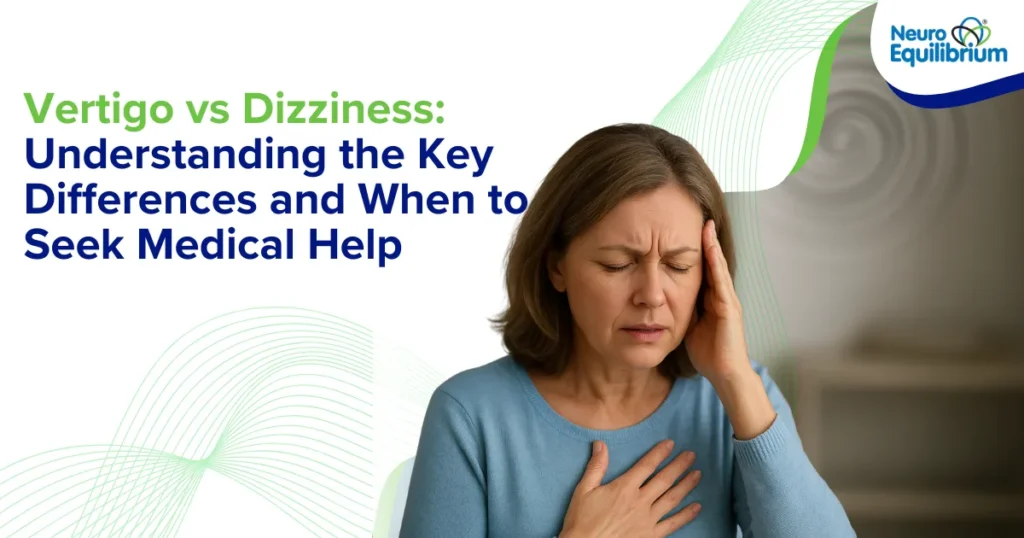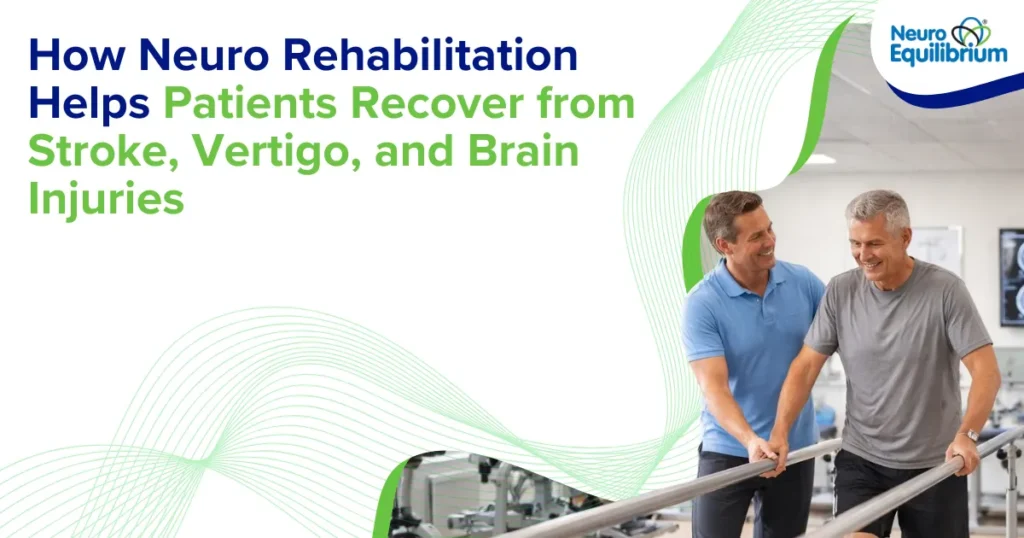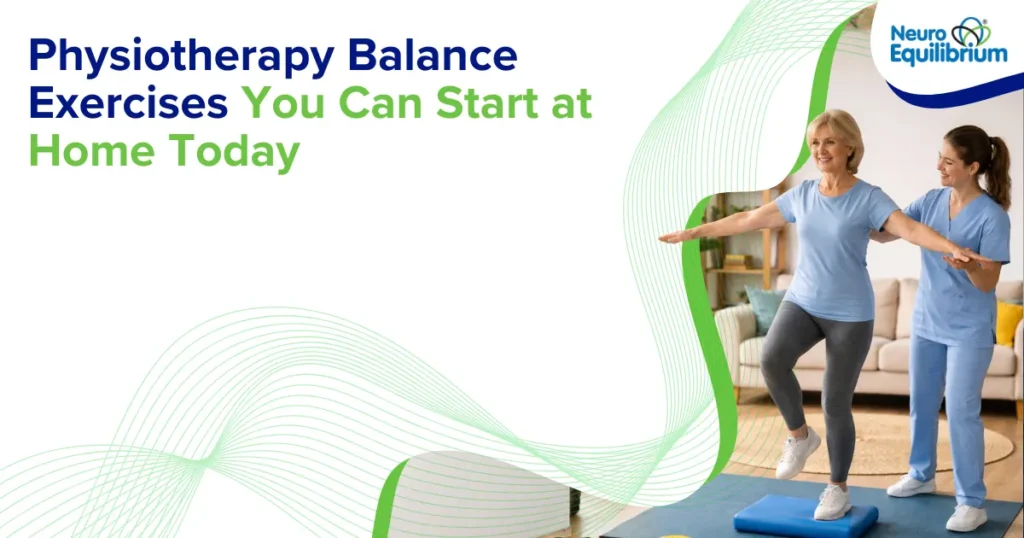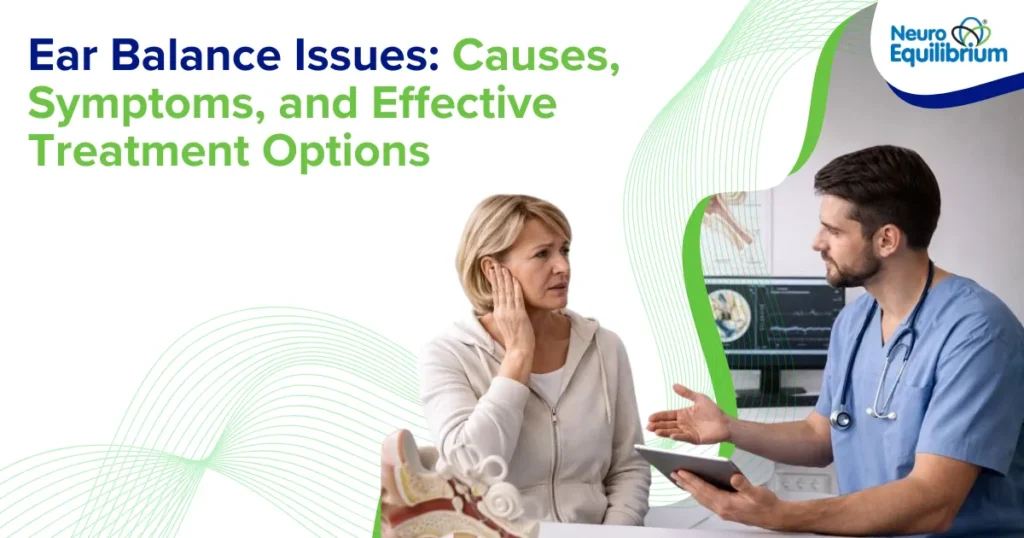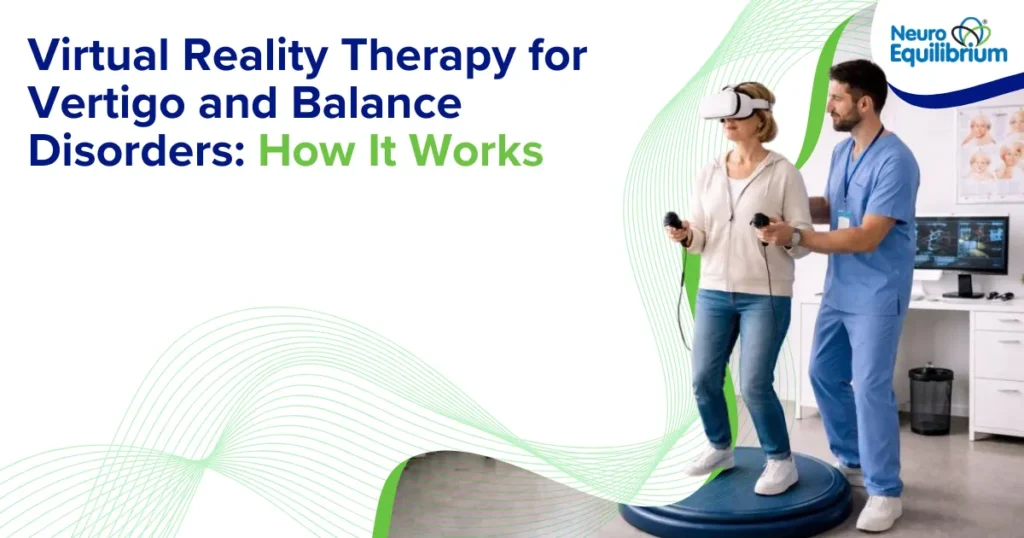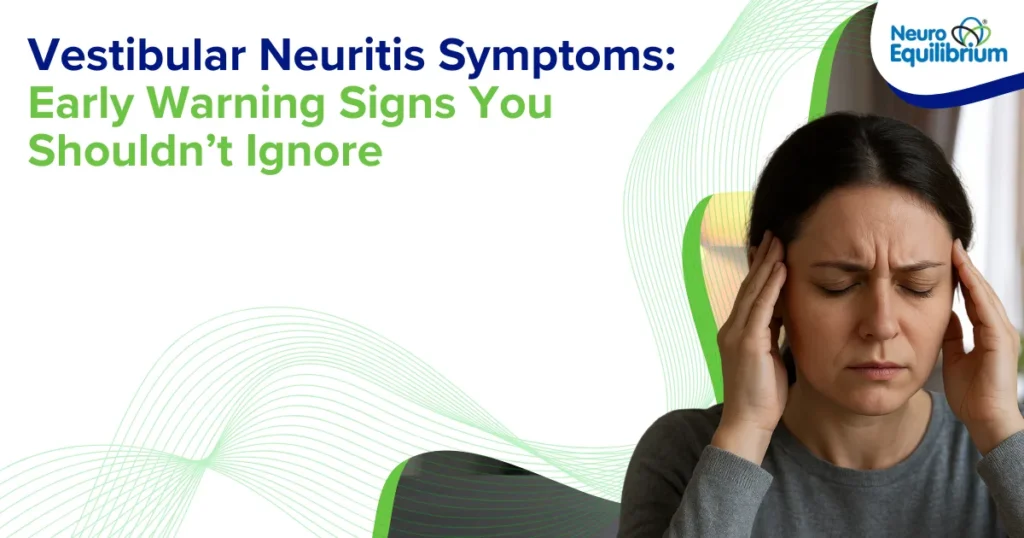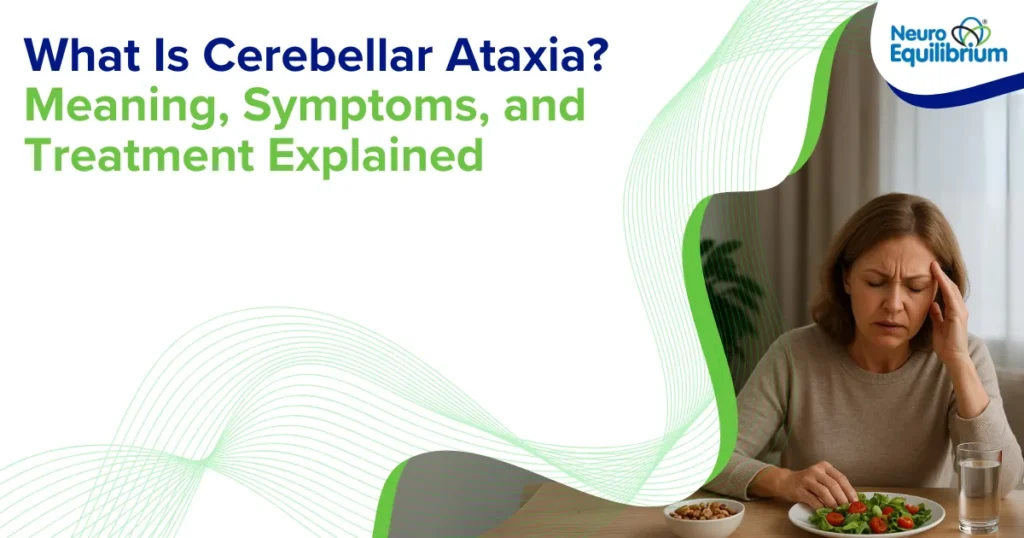Feeling like the world is spinning, tilting, or moving when it actually isn’t can be scary. Many people call this feeling dizziness, but not all dizziness is the same.Sometimes, it is vertigo, a particular type of sensation.. Knowing the difference between vertigo vs dizziness (and dizziness vs vertigo) helps you understand what your body is trying to tell you and when to get the proper medical care.
Know More About Vertigo
- The Complex Relationship Between Stress and Vertigo
- Home Management of Vertigo: A Guide to Symptom Alleviation
- Vertigo Treatment: Causes, Symptoms, and Medical Options
Vertigo vs Dizziness: What’s the Difference?
Even though many people use the words vertigo and dizziness to describe the same thing, they are not the same.
Vertigo is the feeling that you or your surroundings are spinning or moving, even when you are perfectly still. It is definite. It may feel like:
- The room is rotating,
- You are swaying or tipping,
- You are being pulled to one side.
In many parts of India, people call this sensation “chakkar”.
Vertigo usually comes from problems in your inner ear (the balance center) or the parts of the brain that control balance.
Dizziness however, is a broader term. It does not always make you feel like you’re spinning.
Dizziness may feel like:
- You are lightheaded,
- You might faint,
- You are unsteady when walking,
- Your head feels “empty” or “floating”.
So, understanding the difference between vertigo and dizziness matters because the specific sensation helps doctors identify the underlying cause.
| Aspect | Vertigo | Dizziness |
| Type of Sensation | A clear sensation of spinning, tilting, rotating, or swaying, even when still | A general feeling of lightheadedness, wooziness, unsteadiness, or feeling faint |
| How It Feels | Feels like you or the surroundings are moving or rotating | May feel like you might fall, lose balance, or blackout |
| Cause Area | Usually linked to problems in the inner ear balance system or brain balance centers | Can come from inner ear issues but also from blood pressure changes, dehydration, anemia, stress, or medication side effects |
| Specificity | A specific type of dizziness | A broad term that includes many different sensations |
| Common Conditions Involved | BPPV, Ménière’s disease, Vestibular neuritis, Vestibular migraine | Low blood pressure, anxiety, dehydration, anemia, medication reactions, blood sugar fluctuations |
| Movement Relation | Often triggered or worsened by head movements | May occur even without movement |
| Balance Impact | Can cause strong imbalance and nausea during spinning episodes | May cause general unsteadiness without spinning |
Common Causes of Vertigo and What They Feel Like
Vertigo is not a disease by itself. It is a symptom that can come from different problems in the balance system of the inner ear or the brain. Each condition causes a slightly different type of dizziness, and knowing the difference can help identify the right treatment. Below is a simple breakdown of common vertigo causes, what they typically feel like, how long they last, and what might trigger them. This can help you recognize patterns and better explain your symptoms to a doctor.
| Condition | What You Feel | How Long Does It Last | Triggers | Other Symptoms |
| BPPV (Benign Paroxysmal Positional Vertigo) | Intense spinning when shifting your head | Seconds (usually under 30 sec) | Turning in bed, bending, looking up | No hearing loss |
| Meniere’s Disease | Attacks of spinning | Hours | Often random | Hearing loss, ringing in the ear, ear fullness |
| Vestibular Migraine | Dizziness or spinning | Minutes to days | Light, stress, and certain foods | Light sensitivity, nausea, headache (sometimes no headache!) |
| Vestibular Neuritis / Labyrinthitis | Suddenly, severe vertigo | Days | Often, after a viral infection | With labyrinthitis: hearing loss |
| PPPD (Persistent Postural Perceptual Dizziness) | Rocking or swaying for long periods | Weeks to months | Busy visual environments, movement | Anxiety, imbalance |
When Should You Seek Medical Help?
In many cases, vertigo is not dangerous. However, if it occurs along with double vision, slurred speech, sudden numbness or weakness of the face, arms, or legs, difficulty walking, a severe headache, or fainting, seek emergency medical help immediately, as these could be signs of a serious condition.This is also why you want to see a vertigo specialist in case you continue experiencing the spinning episodes, feel unsteady on your feet days or weeks later, notice that you feel dizzy when turning your head, ringing in your ears or hearing loss, fear you might fall, feel that the regular medicines are not working, or you are over 60 years and your balance is unsteady. A correct diagnosis can help in a speedy and more effortless recovery.
What Tests Help Diagnose Vertigo?
There are occasions when normal brain scans such as MRI or CT scans fail to reveal problems within our inner ear where our balance system is found. In this way, to determine precisely what is causing an individual to have vertigo or dizziness, a specialist can conduct the Vestibular Diagnostic Tests. These are examinations to determine the functionality of your eyes, ears and brain by ensuring that there is coordination to keep you on your feet.
Some common tests include:
- Videonystagmography (VNG): This is a procedure whereby the balance system is monitored by using special goggles and tracking the eye movement.
- Video Head Impulse Test (vHIT): Evaluates the responsiveness of the inner ear to the moving of the head at a rapid speed.
- Dynamic Visual Acuity (DVA):This is an examination of the vision in motion of your head.
- Checks balance standing on different surfaces: Posturography.
- Audiometry: Interprets hearing abilities because balance ailments can likewise be connected to hearing.
- SVV (Subjective Visual Vertical): The test of the subjective perceptions of what is straight or upright, through emotions of the inner ear.
These tests help doctors accurately identify the cause of vertigo, allowing for targeted and effective treatment rather than guesswork.
Services Commonly Provided for Vertigo & Dizziness by Top Specialities in India
| Service | Purpose |
| Advanced Vestibular Testing | To get a full evaluation of the balance system |
| Personalized Diagnosis | To find the specific reason you are dizzy, not just general treatment |
| BPPV Treatment (Crystal Repositioning) | To move misplaced inner ear crystals back to their correct place |
| Vestibular Rehabilitation Therapy (VRT) | Special exercises to improve balance and reduce dizziness over time |
| Migraine-Related Vertigo Care | For people whose dizziness is linked to migraines |
| Dizziness and Imbalance Rehabilitation | Helps improve walking stability and confidence |
| Tinnitus Evaluation and Management | For ringing or buzzing sounds in the ear |
| Teleconsultation Guidance (available in many centers) | For remote support and follow-ups if you cannot visit easily |
NeuroEquilibrium clinics use advanced vestibular testing and expert evaluation to pinpoint the exact cause of vertigo, ensuring treatment is focused, accurate, and effective. If you or someone close to you has been experiencing spinning sensations, imbalance, or repeated dizzy episodes, remember that you do not have to live with it.With the right assessment and care, vertigo and dizziness can be effectively treated, and balance can be restored. Book an appointment today.
Sources
- “How to Tell the Difference Between Vertigo and Dizziness.” Healthline. https://www.healthline.com/health/vertigo-vs-dizziness (Healthline)
- “Vertigo vs. Dizziness: What’s the Difference?” Wogensenneurology blog. https://www.wogensenneurology.com/blog/vertigo-vs-dizziness-whats-the-difference (wogensenneurology.com)
- “Dizziness, Vertigo and Balance Disorders.” Better Health Victoria. https://www.betterhealth.vic.gov.au/health/conditionsandtreatments/dizziness-and-vertigo (Better Health Channel)
- “Dizziness vs. Vertigo: What are they and what’s the difference?” King Edward VII Health Hub. https://www.kingedwardvii.co.uk/health-hub/dizziness-and-vertigo-what-is-the-difference-and-what-are-the-causes (King Edward VII’s Hospital)
- “Dizziness vs. Vertigo: Treatment, cures and physical therapy.” UCHealth (2024). https://www.uchealth.org/today/dizziness-vs-vertigo-treatments-cures-physical-therapy/ (UCHealth)
- Stanton M., et al. (2023). Vertigo in Clinical Practice: Evidence-Based Diagnosis and Management. NCBI Bookshelf. (NCBI)
- “Dizziness and Vertigo.” MSD Manuals (ENT Disorders). https://www.msdmanuals.com/en-in/home/ear-nose-and-throat-disorders/symptoms-of-ear-disorders/dizziness-and-vertigo (MSD Manuals)
Is vertigo the same as dizziness?
Vertigo is not the same as dizziness. Vertigo specifically refers to the sensation of spinning, tilting, or swaying, even when you are still, whereas dizziness is a broader term that may describe lightheadedness or imbalance. Vertigo points toward an issue with the inner ear or brain balance pathways. Dizziness can have many causes and does not always involve a spinning feeling.
Can vertigo go away on its own?
Some forms of vertigo, particularly mild cases of BPPV, may resolve spontaneously as the inner ear normalizes. Nevertheless, there are certain repositioning maneuvers that will be quicker and more effective. In case the cases of vertigo are frequent, severe, or persistent, they should be evaluated. Effective diagnosis allows us to make sure that the proper treatment is provided and does not ignore other conditions.
What triggers vertigo?
The head movements, inner ear infections, migraines, stress or changes in the blood pressure may induce vertigo. Raising head, turning over, or crouching has the potential to induce spinning in BPPV. Episodes can also be triggered by inflammation, alterations in fluid pressure and sensitivity related to migraine. The symptoms can be aggravated or increased by stress and anxiety, which leads to a vicious circle of dizziness and tension.
How is vertigo treated?
Treatment depends on identifying the underlying cause. BPPV is managed with repositioning maneuvers to move ear crystals back into place. Vertigo caused by migraine may improve with lifestyle adjustments and preventive medication. Inner ear inflammation is treated with medication followed by vestibular rehabilitation exercises. Long-lasting dizziness may also benefit from balance training and psychological support when anxiety is involved.
Can anxiety cause dizziness?
Yes, anxiety may play a role in making one feel dizzy, or vertigo more severe. Stress may also increase the sensitivity of the balance system causing one to feel unsteady or rocking. Breathing patterns and muscle tension are also altered in case of anxiety, a factor that can make a person lightheaded. The cycle can be broken by reducing stress levels and dealing with anxious thoughts to help treat the symptoms in the course of time.






